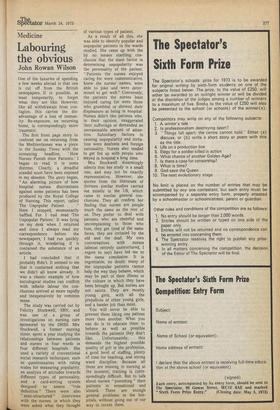Medicine
Labouring the obvious
John Rowan Wilson
One of the luxuries of spending a few weeks abroad is that one is cut off from the British newspapers. It is possible, at least temporarily, to forget what they are like. However, like all withdrawals from contagion, this carries the disadvantage of a loss of immunity. Re-exposure, on returning home, is correspondingly more traumatic.
The first front page story to 2onfront me on returning from the Mediterranean was a piece in the Sunday Times with the screaming headline, 'How Nurses Punish their Patients.' I began to read it in some distress. Clearly, a dreadful scandal must have been exposed in my absence. The story began, " An alarming picture of how hospital nurses discriminate against some patients has been produced by the Royal College of Nursing. This report, called The Unpopular Patient . . ." Here I stopped, momentarily baffled. For I had read 'The Unpopular Patient.' It was lying on my desk when I returned and since I always read my correspondence before the newspapers, I had run quickly througn it, wondering if it contained the substance of an article.
I had concluded that it probably didn't. It seemed to me that it contained nothing that we didn't all know already. It was a classic example of how sociological studies can confirm with infinite labour the conclusions arrived at more rapidly and inexpensively by common sense.
The study was carried out by Felicity Stockwell, SRN, and was one of a group of investigations on nursing care sponsored by the DHSS. Mrs Stockwell, a former nursing sister, spent a year studying the relationships between patients and nurses in four wards in four different hospitals. She used a variety of conventional social research techniques, such as questionnaires with rating scales for measuring popularity, an analysis of attitudes towards different types of personality, and a card-sorting system designed to assess "role definition." There were also " semi-structured " interviews with the nurses, in which they were asked what they thought of various types of patient.
As a result of all this, she was able to identify popular and unpopular patients in the wards studied. She came up with the by no means startling conclusion that the main factor in determining unpopularity was the personality of the patient. " Patients the nurses enjoyed caring for were communicative, knew the nurses' names, were able to joke and were determined to get well." Conversely, the patients the nurses least enjoyed caring for were those who grumbled or showed their displeasure at being in hospital. Nurses didn't like patients who, in their opinion, exaggerated their sufferings or demanded an unreasonable amount of attention. Subsidiary factors in causing unpopularity and irritation were deafness and foreign nationality. Nurses also tended to get fed up with people who stayed in hospital a long time.
Mrs Stockwell disarmingly admits that her study is a small one, and may not be exactly representative. However, she quotes from the literature of thirteen similar studies carried out mostly in the US, which came to similar general conclusions. They all confirm her finding that nurses are people much the same as the rest of us. They prefer to deal with patients who are cheerful and uncomplaining to those who fuss, they get tired of the same faces, they are irritated by the old and the deaf. My own conversations with nurses (almost entirely unstructured„ I regret to say) have led me to the same conclusion. It is regrettable, no doubt: many of the unpopular patients cannot help the way they behave, which may be part of their illness or the culture in which they have been brought up. But nurses are not saints. They are mostly young girls, with all the prejudices of other young girls, and a harder job than most.
You will never be able to prevent them liking one patient more than another. What you can do is to educate them to behave as well as possible towards the patients they don't like. Unfortunately, this demands the highest possible quality of girl in the profession, a good level of staffing, plenty of time for teaching, and strong ward discipline. Because all these are missing in nursing at
the moment: training is correspondingly difficult. But to talk
about nurses " punishing " their patients is sensational and absurd. There are enough general problems in the hospitals, without going out of our way to invent them.


































 Previous page
Previous page